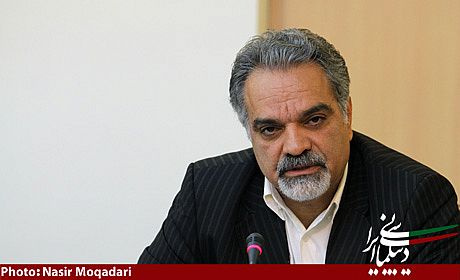Democracy in Iraq in Iran’s Interest

Fortunately, the Islamic Republic of Iran has reached a status where it can state with confidence that it stands by the people in the developments of the region and it supports the peaceful transition of power through election processes in the countries of the region including our neighbors and particularly the two countries which have been engaged in wars during the past three decades, meaning Afghanistan and Iraq. The significance of this status is that some of the regional powers have not yet accepted this fact and pursue war and support radicalism in order to safeguard their interests. This is while the Islamic Republic of Iran has supported the people of the region and believes that the peaceful transition of power through elections would provide both the interests of the people of the region and Iran’s interests. This status is extraordinarily important and one must insist on the fact that this position would protect the interests of all the governments and people of the region and insistence upon this position would promote Iran’s regional and international status.
The second point which must be mentioned is that despite all the election campaigns and the war in the western part of Iraq, elections in Iraq with the participation of more than 12 million Iraqis, who constitute 60% of the eligible voters, is by itself a victory for the people of Iraq and the elites of this country who decided to participate in a political process which is very significant in Iraq. Therefore, we must congratulate the people and political elites of Iraq who were able to hold elections under such difficult circumstances.
The third point which I, as an analyst, would like to point out and which is separate from the policies of the government with regard to Iraq is that Iraq’s elections are faced with challenges which I will mention now. The elections in Iraq are packaged in a way which strengthens ethnicism in Iraq. The combination of the population in Iraq and the presence of the three big ethnic groups, the Sunnis, Shiites and the Kurds, and the deprivations and discriminations which were implemented against two of these groups, meaning the Shiites and the Kurds, have led to the fact that, in the Iraqi constitution, the political divisions are set to strengthen religious and ethnic rivalries. In Iraq, a political majority will not be formed in the short-term and medium-term and the government of Iraq will not be a government which would come out of the political majority of the parliament. The elections in Iraq are designed in a way that perhaps the main talks are made in the post-election coalitions and the importance of these coalitions is much higher than the elections themselves. Of course, the elections are important in determining the status of the people but the factions that form after the elections play a greater role in determining the three major posts, the president, the prime minister, and the parliament speaker. This issue somehow reduces the significance of the Iraqi people’s votes and perhaps it would be better if the Iraqi people could directly or indirectly determine these major posts. The first point which I mentioned with regard to the challenges of the elections in Iraq is of importance because unfortunately ethnic wars are at their climax in the region. The reflection of this ethnic war in Iraq is that the elections are transformed into a scene of rivalry between different ethnic groups. Even inside any of these major groups of Kurds, Shiites and Sunnis, the votes are directed towards those personalities who have more ethnic inclinations.
Despite all the challenges that exist in Iraq’s elections, I hope that the Iraqis would be able to overcome these problems in a long-term political process. It seems that the peaceful transition of power through elections in a country which is involved in ethnic wars is by itself a victory for the people of Iraq.

